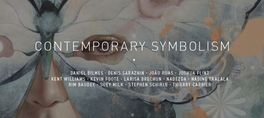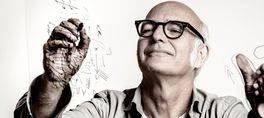How can artists and scientists collaborate to shine a new light on the future of technology and society? How does philosophy and empathy help us anticipate and address the opportunities and challenges ahead?
We welcome two experts exploring the implications of new technology on ethics and empathy. Jodi Halpern, MD, PhD, UC Berkeley Professor of Bioethics and Medical Humanities, and Jonathon Keats, the principal artist behind Mental Work, whom The Atlantic has called a “multimedia philosopher-prophet.”
Together, we’ll explore how science communicators can broaden the conversation around the impacts of tech and science on our society.
This event is held alongside the Mental Work exhibition, a philosophical thought experiment on view at the swissnex Gallery, raising questions about the potential consequences of the Cognitive Revolution. It is part of swissnex San Francisco's ongoing explorations into the emergent future of Intelligent Machines.
Program
6:30pm — doors open7:00pm — talks 7:45pm — networking9:00pm — doors close
Bios
Jodi Halpern
Jodi Halpern, M.D., Ph.D (Philosophy) is the UC Berkeley Professor of Bioethics and Medical Humanities. Her work brings together psychiatry, philosophy, affective forecasting and decision neuroscience. Halpern shows how the traditional dichotomizing of empathy into emotional resonance and cognitive knowledge is wrong-headed. She shows how empathy is a fundamentally imaginative process requiring affective guidance and the formation of as-if or quasi beliefs. Halpern describes empathy as "day-dreaming someone else's experience." Her first book, From Detached Concern to Empathy: Humanizing Medical Practice was called a “seminal work” by JAMA. Her upcoming book Remaking the Self in the Wake of Illness focuses on resiliency. Halpern’s current project, titled Engineering Empathy, considers how technologies such as VR and AR as well as robotics and AI are envisioned as addressing gaps in human empathy and the complexity of such aspirations. Halpern is invited to present this work internationally, including at the 2018 meeting of the World Economic Forum in Davos, Switzerland.
Jonathon Keats
Acclaimed as a “poet of ideas” by The New Yorker and a “multimedia philosopher-prophet” by The Atlantic, Jonathon Keats is an artist, writer and experimental philosopher based in San Francisco and Northern Italy. His conceptually-driven interdisciplinary projects explore all aspects of society through science and technology. In recent years, he has installed a camera with a thousand-year-long exposure – documenting the long-term effects of climate change – at Arizona State University; opened a photosynthetic restaurant serving gourmet sunlight to plants at the Crocker Art Museum; exhibited extraterrestrial abstract artwork decoded from Arecibo Observatory radiotelescope data at the Judah L. Magnes Museum; and applied quantum mechanics to banking – coaxing money into a quantum superposition to be shared by everyone – at Rockefeller Center.
Photo: Mental Work machinery by Astra Brinkmann for swissnex SF.
show less
We welcome two experts exploring the implications of new technology on ethics and empathy. Jodi Halpern, MD, PhD, UC Berkeley Professor of Bioethics and Medical Humanities, and Jonathon Keats, the principal artist behind Mental Work, whom The Atlantic has called a “multimedia philosopher-prophet.”
Together, we’ll explore how science communicators can broaden the conversation around the impacts of tech and science on our society.
This event is held alongside the Mental Work exhibition, a philosophical thought experiment on view at the swissnex Gallery, raising questions about the potential consequences of the Cognitive Revolution. It is part of swissnex San Francisco's ongoing explorations into the emergent future of Intelligent Machines.
Program
6:30pm — doors open7:00pm — talks 7:45pm — networking9:00pm — doors close
Bios
Jodi Halpern
Jodi Halpern, M.D., Ph.D (Philosophy) is the UC Berkeley Professor of Bioethics and Medical Humanities. Her work brings together psychiatry, philosophy, affective forecasting and decision neuroscience. Halpern shows how the traditional dichotomizing of empathy into emotional resonance and cognitive knowledge is wrong-headed. She shows how empathy is a fundamentally imaginative process requiring affective guidance and the formation of as-if or quasi beliefs. Halpern describes empathy as "day-dreaming someone else's experience." Her first book, From Detached Concern to Empathy: Humanizing Medical Practice was called a “seminal work” by JAMA. Her upcoming book Remaking the Self in the Wake of Illness focuses on resiliency. Halpern’s current project, titled Engineering Empathy, considers how technologies such as VR and AR as well as robotics and AI are envisioned as addressing gaps in human empathy and the complexity of such aspirations. Halpern is invited to present this work internationally, including at the 2018 meeting of the World Economic Forum in Davos, Switzerland.
Jonathon Keats
Acclaimed as a “poet of ideas” by The New Yorker and a “multimedia philosopher-prophet” by The Atlantic, Jonathon Keats is an artist, writer and experimental philosopher based in San Francisco and Northern Italy. His conceptually-driven interdisciplinary projects explore all aspects of society through science and technology. In recent years, he has installed a camera with a thousand-year-long exposure – documenting the long-term effects of climate change – at Arizona State University; opened a photosynthetic restaurant serving gourmet sunlight to plants at the Crocker Art Museum; exhibited extraterrestrial abstract artwork decoded from Arecibo Observatory radiotelescope data at the Judah L. Magnes Museum; and applied quantum mechanics to banking – coaxing money into a quantum superposition to be shared by everyone – at Rockefeller Center.
Photo: Mental Work machinery by Astra Brinkmann for swissnex SF.
How can artists and scientists collaborate to shine a new light on the future of technology and society? How does philosophy and empathy help us anticipate and address the opportunities and challenges ahead?
We welcome two experts exploring the implications of new technology on ethics and empathy. Jodi Halpern, MD, PhD, UC Berkeley Professor of Bioethics and Medical Humanities, and Jonathon Keats, the principal artist behind Mental Work, whom The Atlantic has called a “multimedia philosopher-prophet.”
Together, we’ll explore how science communicators can broaden the conversation around the impacts of tech and science on our society.
This event is held alongside the Mental Work exhibition, a philosophical thought experiment on view at the swissnex Gallery, raising questions about the potential consequences of the Cognitive Revolution. It is part of swissnex San Francisco's ongoing explorations into the emergent future of Intelligent Machines.
Program
6:30pm — doors open7:00pm — talks 7:45pm — networking9:00pm — doors close
Bios
Jodi Halpern
Jodi Halpern, M.D., Ph.D (Philosophy) is the UC Berkeley Professor of Bioethics and Medical Humanities. Her work brings together psychiatry, philosophy, affective forecasting and decision neuroscience. Halpern shows how the traditional dichotomizing of empathy into emotional resonance and cognitive knowledge is wrong-headed. She shows how empathy is a fundamentally imaginative process requiring affective guidance and the formation of as-if or quasi beliefs. Halpern describes empathy as "day-dreaming someone else's experience." Her first book, From Detached Concern to Empathy: Humanizing Medical Practice was called a “seminal work” by JAMA. Her upcoming book Remaking the Self in the Wake of Illness focuses on resiliency. Halpern’s current project, titled Engineering Empathy, considers how technologies such as VR and AR as well as robotics and AI are envisioned as addressing gaps in human empathy and the complexity of such aspirations. Halpern is invited to present this work internationally, including at the 2018 meeting of the World Economic Forum in Davos, Switzerland.
Jonathon Keats
Acclaimed as a “poet of ideas” by The New Yorker and a “multimedia philosopher-prophet” by The Atlantic, Jonathon Keats is an artist, writer and experimental philosopher based in San Francisco and Northern Italy. His conceptually-driven interdisciplinary projects explore all aspects of society through science and technology. In recent years, he has installed a camera with a thousand-year-long exposure – documenting the long-term effects of climate change – at Arizona State University; opened a photosynthetic restaurant serving gourmet sunlight to plants at the Crocker Art Museum; exhibited extraterrestrial abstract artwork decoded from Arecibo Observatory radiotelescope data at the Judah L. Magnes Museum; and applied quantum mechanics to banking – coaxing money into a quantum superposition to be shared by everyone – at Rockefeller Center.
Photo: Mental Work machinery by Astra Brinkmann for swissnex SF.
read more
We welcome two experts exploring the implications of new technology on ethics and empathy. Jodi Halpern, MD, PhD, UC Berkeley Professor of Bioethics and Medical Humanities, and Jonathon Keats, the principal artist behind Mental Work, whom The Atlantic has called a “multimedia philosopher-prophet.”
Together, we’ll explore how science communicators can broaden the conversation around the impacts of tech and science on our society.
This event is held alongside the Mental Work exhibition, a philosophical thought experiment on view at the swissnex Gallery, raising questions about the potential consequences of the Cognitive Revolution. It is part of swissnex San Francisco's ongoing explorations into the emergent future of Intelligent Machines.
Program
6:30pm — doors open7:00pm — talks 7:45pm — networking9:00pm — doors close
Bios
Jodi Halpern
Jodi Halpern, M.D., Ph.D (Philosophy) is the UC Berkeley Professor of Bioethics and Medical Humanities. Her work brings together psychiatry, philosophy, affective forecasting and decision neuroscience. Halpern shows how the traditional dichotomizing of empathy into emotional resonance and cognitive knowledge is wrong-headed. She shows how empathy is a fundamentally imaginative process requiring affective guidance and the formation of as-if or quasi beliefs. Halpern describes empathy as "day-dreaming someone else's experience." Her first book, From Detached Concern to Empathy: Humanizing Medical Practice was called a “seminal work” by JAMA. Her upcoming book Remaking the Self in the Wake of Illness focuses on resiliency. Halpern’s current project, titled Engineering Empathy, considers how technologies such as VR and AR as well as robotics and AI are envisioned as addressing gaps in human empathy and the complexity of such aspirations. Halpern is invited to present this work internationally, including at the 2018 meeting of the World Economic Forum in Davos, Switzerland.
Jonathon Keats
Acclaimed as a “poet of ideas” by The New Yorker and a “multimedia philosopher-prophet” by The Atlantic, Jonathon Keats is an artist, writer and experimental philosopher based in San Francisco and Northern Italy. His conceptually-driven interdisciplinary projects explore all aspects of society through science and technology. In recent years, he has installed a camera with a thousand-year-long exposure – documenting the long-term effects of climate change – at Arizona State University; opened a photosynthetic restaurant serving gourmet sunlight to plants at the Crocker Art Museum; exhibited extraterrestrial abstract artwork decoded from Arecibo Observatory radiotelescope data at the Judah L. Magnes Museum; and applied quantum mechanics to banking – coaxing money into a quantum superposition to be shared by everyone – at Rockefeller Center.
Photo: Mental Work machinery by Astra Brinkmann for swissnex SF.
show less
Date/Times:
Pier 17, Suite 800, San Francisco, CA 94111
The Best Events
Every Week in Your Inbox
From Our Sponsors
UPCOMING EVENTS
Great suggestion! We'll be in touch.
Event reviewed successfully.









